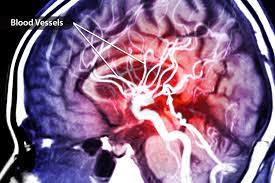My stroke was inherited, a Protein S deficiency which causes blood clots. And you probably know the rest and the reason this blog came about.I've been quite stressed lately because I've been inside, no thanks to the pandemic, and I thought, bordering on overthinking, would stress give a person a stroke? Or a second stroke?
Most people already understand that high blood pressure, high cholesterol, and smoking increase a person’s risk of stroke. But without those negative situations, can plain old stress cause a stroke? Unfortunately, studies have shown so, all around the world. Just a sampling....
The Copenhagen City Heart Study, who asked people about their stress levels and analyzed their health, concludes, “Self-reported high-stress intensity and weekly stress were associated with a higher risk of fatal stroke compared with no stress.”
Researcher Ana Maria Garcia, MD, of the Hospital Clinico Universitario San Carlos in Madrid, says, “Our findings indicate that people can lower their stroke risk by attempting to reduce the stress in their lives. The study included 150 people who'd had strokes and 300 randomly selected people who had not had strokes. The average age of the participants was 54, which is much younger than the typical stroke patient."
Garcia says that studying the correlation of stress on stroke was easier in younger people who had strokes because they were less likely to have health issues like high blood pressure that have been linked to stroke.
The American Academy of Neurology says that anger and other negative emotions may be triggers for ischemic stroke. The study found that people who had strokes were more likely to have experienced anger or negative emotions in the two hours prior to the stroke than at the same time the day before the stroke. They were also more certain to have reacted fast to a surprising event, such as arising at night suddenly after hearing a child tumble and cry or standing up from a chair in haste after witnessing a tumultuous noise.Stress causes the brain to release certain substances that adapt the body to confront a risk. They are known as chemicals: cortisol which prompts the body to retain water, salt, and sugar to help keep blood pressure on the up side and, in most cases, allows the body has extra power to function, and epinephrine which increases heart rate and blood pressure to distribute blood to the organs.
Flint Rehab says, "Persistent high cortisol levels increase salt retention, which leads to hypertension (high blood pressure) and high cholesterol levels. High cholesterol and blood pressure in turn both increase your risk of stroke. In addition, high blood pressure from chronic stress can increase the risk of a hemorrhagic stroke, which occurs when blood vessels rupture."
It's the chronic stress, not once-in-a-while stress, that can cause a stroke. Here is a list of many signs that you're in a stressful situation:
- Chest pain
- Sudden headaches
- Low energy
- Stomach problems such as diarrhea
- Tense muscles
- Shaking and/or cold sweaty hands
- Insomnia
- Dry mouth and difficulty swallowing
Stress can also cause emotional and cognitive issues such as the onslaught of frustration regularly or constant memory loss. Since there is a strong tie between stress and stroke, it’s important to find ways to incorporate lifestyle changes such as eating a healthy diet, doing meaningful exercises, and practicing meditation.
But all that said, lousy inherited genes like I have? Unfortunately, there's no help for that. BAM!!! Just like so.


No comments:
Post a Comment